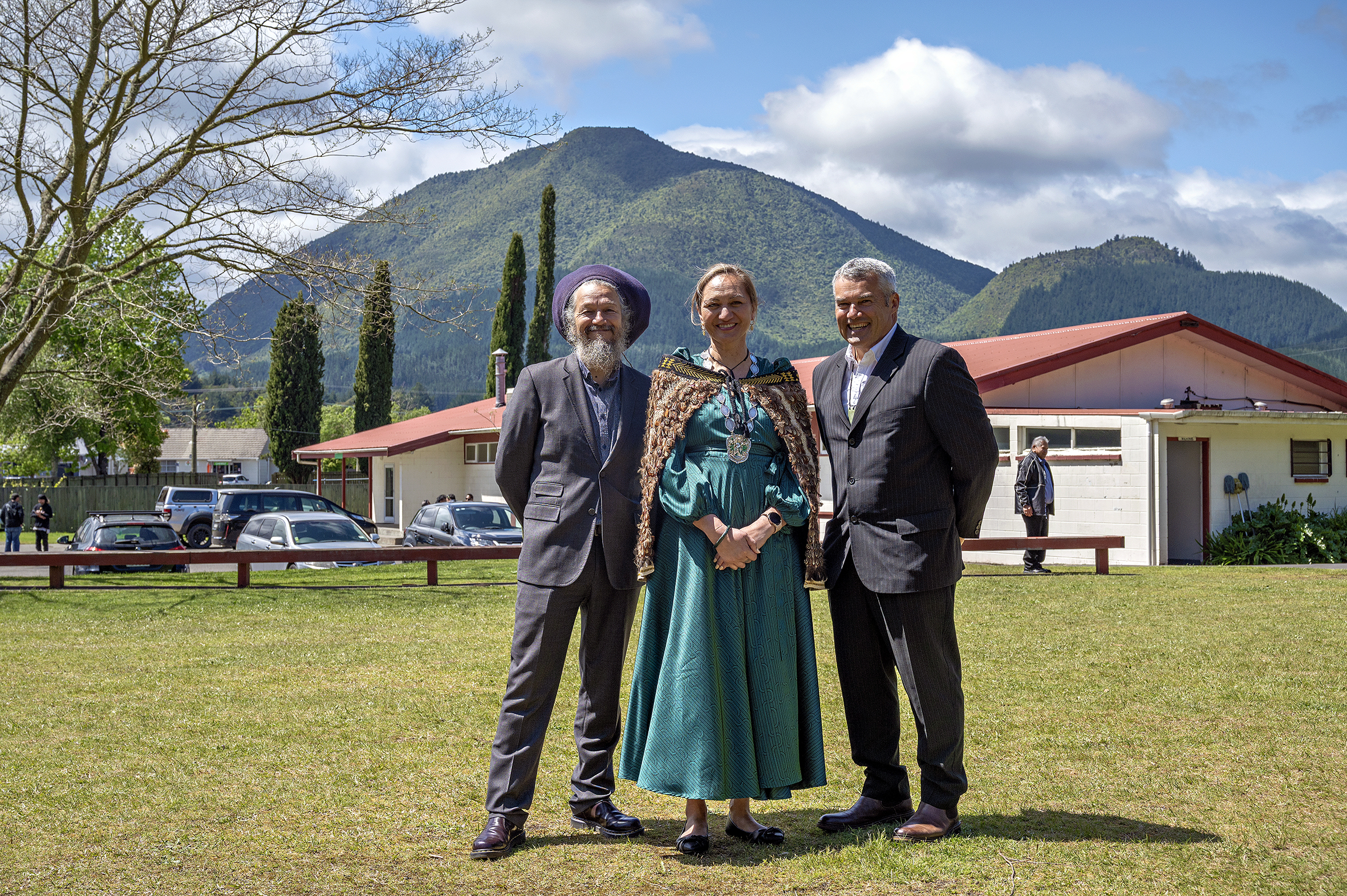Taiao ‘of greatest importance’

Too fast: The three Eastern Bay mayors, Whakatāne’s Nandor Tanczos, Kawerau’s Faylene Tunui and Ōpōtiki’s David Moore, released a joint statement yesterday regarding the proposed simplification of local government, saying it is happening too quickly. Photo supplied
Diane McCarthy
Newly elected Bay of Plenty regional councillors from the Eastern Bay may be gone by mid-2026 if a proposal to simplify local government announced on Tuesday goes ahead.
Malcolm Campbell, Sarah van der Boom and Kōhi Māori councillor Mawera Karetai all say the Government has been signalling change for some time.
The Government proposed a major shake-up of local government late yesterday afternoon, with the release of a consultation document with options that could see the scrapping of regional councils altogether.
Minister for RMA Reform Chris Bishop described the major shake-up as the most significant changes to local government since 1989.
Proposals include abolishing regional councillors and creation of new Combined Territories Boards made up of district mayors to lead regional reorganisation plans within the next two years.
The proposal is available to read on the Department of Internal Affairs website and anyone wishing to make a submission must do so before February 20.
Ms Karetai said councillors needed to engage with the public to make sure the change is in the best interests of our community.
“People come and go, but the taiao (environment) remains, and we must make sure that our local and central government policies reflect that.
“My intention is to organise some community meetings to help our community engage in the consultation process, so any decisions made, are made with us.”
Mrs van der Boom stated during her election campaign that she was supportive of local government reform and is still in favour of it, providing it is fit for purpose.
“We need to move toward a system that delivers key functions at a regional and district level as cost-effectively as possible,” she said.
“Community and stakeholders are best placed to determine key functions, and ultimately, the best form for local government.
“My role is to make sure community and stakeholder interests have a voice in local government reform discussions, so that central government does not dictate functions and form that are not fit for purpose,” Mrs van der Boom said.
Mr Campbell said the most important thing was making sure everybody was fully aware of what regional councils actually do.
“We are definitely not against reform. We are for looking at ways to make it more affordable for our ratepayers.
LLooking at the options they’ve given us. Obviously they’re saying we can get rid of all the elected members, but it’s not about us. It’s about what the ratepayer is going to get for their money.
“At this point in time, my responsibility to the over 7000 people who elected me in October is to make sure that they’re going to get the best deal that is available for them.”
He said the ramifications could be pretty bad.
“At the end of the day, the environment and water are the most important things.
“Those things have still got to be funded whether it’s through the regional council or through the territorial authorities.”
He said cost savings of getting rid of regional councillors would be minimal.
Ōpōtiki Mayor David Moore was not able to be reached yesterday, but Whakatāne District Council released a group statement by the three Eastern Bay mayors, Mr Moore, Kawerau’s Faylene Tunui and Whakatāne’s Nandor Tanczos, acknowledging that change may be needed in local government organisation.
“We are willing to engage constructively in that discussion,” the statement said.
However, they described the process outlined on Tuesday as “unnecessarily rushed”.
“Changes of this scale are constitutionally significant, and they warrant a process that reflects that importance.
“Regional councillors were elected by their communities with a clear mandate, and those communities rightly expect their elected representatives to serve out the full term.”
They said allowing this would provide the time needed for a more meaningful and complete discussion.
Their priorities in such a discussion would include protecting the natural environment, upholding tangata whenua participation as a core element of local governance, preserving local decision-making and ensuring strong and accessible community input.
The proposal requires the Combined Territories Boards to work with post-settlement governance entities to implement any Treaty settlement commitments administered by the regional council and keep any committees established as part of a Treaty settlement in place.
“However, Bay of Plenty Regional Council has a legislative requirement to have Māori constituencies, while the proposal has no Māori constituency seats on the board as they will be made up of mayors, who are voted for at large.
